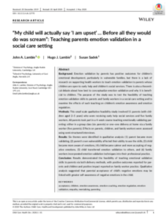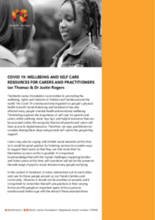Displaying 141 - 150 of 947
This article presents a multi-site evaluation of a group delivery of the eight-week Circle of Security-Parent DVD program (COS-P) program to foster carers of 6-12 year-old children in an urban community as facilitated by community-based providers from a specialist child and youth mental health services.
There has recently been increased interest in the potential for formal and informal networks to aid interventions with biological families in helping them achieve reunification in the context of the child protection system. This article analyzes the conceptualization of social support in order to create social support networks.
This briefing explores the importance of self-care for parents and carers, whilst outlining some ‘top-tips’ and helpful resources that can be accessed online.
This Note proposes a model New York state statute that will recognize the importance of children's visitation with incarcerated parents, implement “child friendly” visitation programs, facilitate training for prison staff, and provide transportation for children in major cities to the prison facilities.
The study documents the impact of the need-service gap (client did not receive the service they need) on family reunification status among substance-involved parents in the child welfare system.
The aim of this study is to investigate out-of-home placement rates and child outcomes of home-visiting interventions.
This review brought together studies which investigate whether or not family group decision making works better, for the children concerned, than traditional child protection decision-making.
This exploratory study examines practitioners’ and foster parents’ perceptions on use of Parent–Child Interaction Therapy in child welfare.
In this article, the authors draw on case study data from the Australian Baby Makes 3 (BM3) programme to explore factors that promote father engagement in parenting support programmes.



